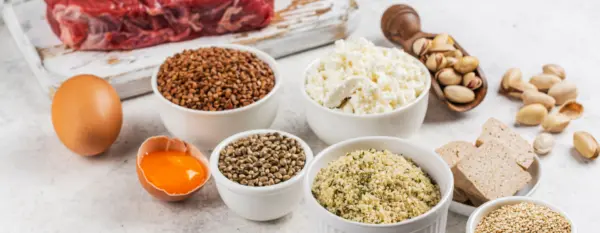Protein is an essential macronutrient, or a nutrient needed in comparatively large quantities, utilized by the body to perform a variety of different functions. Some of the functions of proteins include acting as hormones, enzymes, structural elements, antibodies, and transporters. Proteins are made from amino acids. In the body, many different amino acids are sequenced together to make a protein structure. Proteins then go on to help with the growth and maintenance of body tissues.
There are 20 different amino acids, of which 9 are essential. Essential amino acids are those our body cannot synthesize, so we need to get them from our diet. There are some food sources that are categorized as “complete protein” sources because they contain all 9 essential amino acids. Animal protein, such as meat, poultry, fish, and eggs, would fit under this category.

How Much Protein Do I Need?
Every person is different and has different daily protein needs. Protein needs vary depending on age, weight, health status, and activity level. On average, a healthy adult who exercises regularly needs between 0.8g-1.0g of protein/kg of body weight daily. For example, a person who is 150 lbs (68 kg), who is physically active, should consume between 55-68g of protein per day.
There are certain people who require increased amounts of protein consumption. According to sports nutritionists, high-intensity athletes, such as endurance runners and strength athletes, need between 1.2-2.0g of protein/kg body weight per day. Keep in mind, this is only for high-intensity athletes. If you are exercising regularly, you only need 0.8g-1.0g/kg per body weight.
Pregnant women consume between 75-100g of total protein per day to support the development of the fetus. Older adults and people with chronic or acute illnesses may need increased protein intake as well, which will vary on a case-by-case basis.
Protein equation for a healthy, active adult:
- 0.8g protein x 68kg = about 55 grams of protein per day
- 1.0g protein x 68kg = 68 grams protein per day
- Range = about 55 – 70g protein/day
Protein intake equation for high-intensity athletes:
- 1.2g protein x 68kg = about 80 grams of protein per day
- 2.0g protein x 68kg = about 135 grams protein per day
- Range = about 80 – 135g protein/day
As children get older, they need increased protein intake to assist in their rapid growth and development. The Dietary Guidelines of America state that children ages 1-3 need about 13g of protein per day. Children ages 4-8 need 19g/day, and children ages 9-13 need 34g/day. After 14 years of age, the protein requirements are the same as those of an adult.
Can I Have Too Much Protein?
The quick answer is yes. Adequate protein is a hot topic for athletes and the active population due to the plethora of misinformation around protein intake coming from various “health” sources on the internet. Protein shakes, powders, and supplements are also growing in popularity. As a result, many athletes consume more than the upper limit of protein (35% of total calories from protein). According to the National Health and Nutrition Examination Survey, even non-athletes consume more than the dietary reference intake (DRI) recommendation for protein intake. The truth is, the body either excretes extra protein or stores it as fat for later use.
Long-term high protein intake can actually hinder performance and contribute to other health issues. Increased protein intake requires increased water needs, potentially leading to dehydration. Additionally, this can put added strain on the kidneys, which are working to remove excess protein. There is evidence to suggest that high protein consumption also increases the removal of calcium from the bones, increasing the risk of osteoporosis. Both athletes and non-athletes should be encouraged to achieve adequate protein intake from whole food sources first before supplements.
Plant-based Protein
Consuming plant-based proteins is an excellent way to meet your daily protein needs. Good sources include legumes (beans, lentils, tofu, etc.), nuts, seeds, grains, and green peas. Protein obtained from plant sources is usually considered an “incomplete protein” because it does not contain all 9 essential amino acids. However, some plants, such as quinoa, buckwheat, and soy products (tofu, tempeh, edamame, and soy milk), are complete proteins.
By eating a wide variety of plant-based protein sources, it is possible to obtain all 9 essential amino acids daily. One way to ensure a sufficient variety of amino acids is to consume “complementary proteins.” This is the idea of eating 2 or more sources of incomplete protein to make a complete protein. Most grains tend to be low in the amino acid lysine but high in methionine. Most legumes tend to be low in methionine but high in lysine. So by eating peanut butter and jelly or rice and beans, you ensure you are getting enough of both amino acids. It’s important to note that complementary proteins do not need to be eaten in the same meal. Simply eating them within the same day is sufficient. It is important to note that by incorporating a wide variety of colorful, nutrient-dense food items, you are likely getting all nine essential amino acids.
Why is Protein Important for Athletes?
Adequate protein intake is especially important for athletes. Protein is an integral component of bones, ligaments, tendons, and muscles. It is essential for the repair and strengthening of muscles, especially after a high-intensity workout or after a game. Sports nutritionists have noted that low dietary protein can result in decreased performance and increased risk of injury because muscle is not being properly maintained and strengthened. Protein is constantly being broken down, transformed, and rebuilt. In prolonged exercise, protein can even be metabolized for energy. As noted above, a higher protein intake of 1.2-2.0g/kg is recommended for high-intensity athletes.
Remember, protein is an essential nutrient most notably needed to maintain body tissues. Essential amino acids are the ones that must be acquired from food and can be found in many plant or animal sources. Protein needs are highly individualized depending on age, weight, activity level, and health status. Most people need between 0.8-1.0g/kg body weight per day. Requirements may change for athletes, older adults, those with chronic illnesses, pregnant women, and children. It is important that you are aware of your body’s protein requirements so you are not consuming too much or too little.
If you are looking for sports dietitians to help you with your protein intake or simply have questions about your personal nutrition journey, consult with one of our nutrition experts across the United States virtually via our telehealth platform or in person in Chicago, IL by calling us at (312) 374-5399 or by scheduling an appointment online. Remember to also check out our Facebook, Instagram, and Twitter pages for more fun facts and articles on nutrition, physical therapy, and exercise!
Written By Erica Drost
Edited by Alexander Franz
Reviewed by Morgan Murdock, RD.

References
- APA Staff. “Pregnancy Nutrition.” American Pregnancy Association, 3 June 2020, https://americanpregnancy.org/pregnancy-health/pregnancy-nutrition/.
- Caspero, Alexandra. “Protein and the Athlete – How Much Do You Need?” EatRight, 2019, https://www.eatright.org/fitness/sports-and-performance/fueling-your-workout/protein-and-the-athlete.
- Mitra. “PROTEIN – An Uncomplicated Guide for Vegans + Printable PDF.” Pick Up Limes, 17 Nov. 2019, https://www.pickuplimes.com/single-post/2018/02/18/PROTEIN-%C2%BB-an-uncomplicated-guide-for-vegans.
- “Pregnancy Nutrition.” American Pregnancy Association, 3 June 2020, https://americanpregnancy.org/pregnancy-health/pregnancy-nutrition/.
- Unknown. “Appendix 7. Nutritional Goals for Age-Sex Groups Based on Dietary Reference Intakes and Dietary Guidelines Recommendations.” 2015-2020 Dietary Guidelines, 2018, https://health.gov/our-work/food-nutrition/2015-2020-dietary-guidelines/guidelines/appendix-7/.
- Unknown. “Teaching Dietary Protein Basics.” Eatrightpro.org, 2016, https://www.eatrightpro.org/practice/practice-resources/international-nutrition-pilot-project/teaching-dietary-protein-basics.
- Fink, H. H., & Mikesky, A. E. (2015). Practical Applications in Sports Nutrition (4th ed.). Burlington, MA: Jones & Bartlett Learning.













